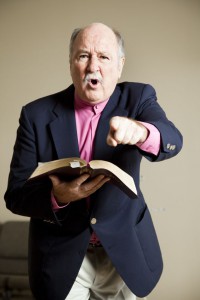Rules Are for Schmucks: Do Christians Complain Too Much?

This just in: a rapidly growing number of Americans think that Christians complain too much. Lifeway Research, an evangelical research firm, just released a study showing that 43 percent of those surveyed agree that “American Christians complain too much about how they are treated.” This figure is up sharply from the 34 percent who agreed with the same statement two years earlier.
A large majority of (59 percent) of religious “Nones” agrees with the statement, as does another majority of (53 percent) who rarely or never attend worship.
Really? How can this be?
One of the pleasantest parts of this time of year is that we’re as far removed from Christian whining about the “War on Christmas” as we can ever be. It doesn’t matter that no such war exists, as David Kyle Johnson demonstrated so thoroughly in The Myths That Stole Christmas. Or, more precisely, that it exists solely in the minds of those who make tons of money “defending” Christmas against the imagined humanist onslaught, as Cathy Lynn Grossman described last year. But a mere calendar can’t keep a good Christian complainer down. Their latest grumble: “chocolate eggs.”
What’s wrong with chocolate eggs, you ask? Apparently it’s the fact that they’re not called “Easter eggs” instead. Having a candy manufacturer call its product a chocolate egg rather than an Easter egg is “deeply disappointing and shameful,” says David Marshall, CEO of the UK-based Meaningful Chocolate Co. He also contends it “shows they’re insensitive and uncomfortable with the Christian faith.”
As pernicious as the “War on Easter” is the one on Thanksgiving. Christian gripemaster Paul Kengor reviewed several books describing Thanksgiving for school children that did not, in his view, properly associate the holiday with God: “The Creator even gets trumped by cranberry sauce.”
Movies and television are another huge source of Christian complaint. The Golden Compass of 2007, for example, was supposed to be the first of a three-film trilogy based on Philip Pullman’s wildly popular His Dark Materials trilogy. It cost $180 million to make and took in $380 million at the box office. By my math, that ain’t bad. So where are the next two films? Scuttled, that’s where; it seems the studio couldn’t deal with all the complaining from the Catholic Church, which was concerned that the evil “Magisterium” seemed too Vatican-esque.
Christians have lately been getting “religious liberty” laws passed right and left to allow them to discriminate against people they don’t like, especially LGBTQ individuals (though most of the laws are not limited to that). The latest, in Tennessee, is a “right to dodge work” law that allows counselors, many of them government employees, to continue getting paid while refusing to provide services to people who don’t appeal to them. This follows in the footsteps of “Kim Davis” laws like the one in North Carolina allowing Christian government clerks to continue getting paid even when they refuse to do the part of their jobs involving issuing marriage licenses. Yet despite all this upheaval, 60 percent of Christians on the Lifeway survey believe that “religious liberty is on the decline in America.”
Leading Southern Baptist apologist Dr. Richard “The Plagiarist” Land describes the notion that government employees should do their jobs as “an intolerant totalitarianism that seeks to punish any variance to its Orwellian groupthink.” Any guesses what kind of brainwashing results in that 60-percent poll result?
It’s hard to imagine what Christians are complaining about. Already this month, which is barely half over, we have a state legislature (Tennessee again) passing a law to make the Bible the “official state book.” (Given the Tennessee location of the Scopes Trial, some of us think On the Origin of Species might have been a better choice.) The governor, who consulted a lawyer, decided to veto a law in such direct contradiction of the First Amendment—generating yet more Christian complaints (and lawmakers plan to hold a vote to override the veto). We have a federal judge in New Jersey ruling that a Christian school, unlike a public school and a nonreligious private school, doesn’t have to go to the (enormous) expense of providing services to special needs and other types of disabled students—despite the fact that the Quaker school in question happily accepts tuition from parents of lots of different faiths. We have twenty-five states piling on with an amicus brief to defend the government’s right to use humanist taxpayers’ money to maintain a forty-foot high crucifix in Bladensburg, Maryland. We have a report from North Carolina about the use of $12 million of state tax money—provided by Christians and non-Christians alike—to support state “scholarships” to private schools, $11 million of which goes to Christian schools. Maybe all the complaints are about the million that got away?
Christians moan and groan when Celebrity Cruise Lines stops giving priests free cruises. When a sobriety check point gets set up by traffic cops near a church. When ostentatious prayer-maven Tim Tebow, who had the lowest pass completion rate of any NFL quarterback, gets cut by his team. When the US Agency for International Development has the chutzpah to require condom distribution in the anti-HIV programs it funds with taxpayer money. When science, of all things, is taught in our schools. When a newspaper says that maybe, just maybe, something more than prayer is needed to stop the wave of mass shootings. Christians even complain, all the way to the Supreme Court, when they have to fill out a form to qualify for special exemptions from the laws that apply to everyone else.
Ted Cruz complains about a girl being threatened with jail for saying a prayer—a claim that turns out to be completely fabricated. Donald Trump complains that the IRS audits him because of his “strong Christian beliefs.” Now, armed with the just-released Lifeway research, Christians have a new complaint: being viewed, terribly unfairly, as people who complain too much.
